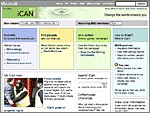Blogging at the BBC: Part 3 - ...and Islands
Yesterday, as part of a series of posts about what I remember of the history of blogging at the BBC, I was looking at the Scotblog. Another major blogging initiative to come out of the BBC Scotland offices was 'Island Blogging'.

I can remember there being some debate in the offices in London about whether any of the technical platforms that were currently being used by the central new media team were suitable to support this initiative. It was felt at the time that the DNA software that powered h2g2 would provide the BBC's future blogging platform. However, it was already expected that DNA would be powering the BBC's iCan beta and a replacement for the howerd2 message board system, taking up all of the available development resource for the next couple of years.


BBC Scotland were ahead of the general BBC curve in wanting a specific blogging platform, and so were left to pursue their own technical solution.
'Island Blogging' was a project to provide a platform for isolated communities on some Scottish islands to share their voices with the nation at large. Users could only apply for a blog if they lived on one of the following islands - Coll, Tiree, Mull, Iona, Lismore, Kerrera, Seil, Easdale, Luing, Colonsay, Jura, Islay, Bute, Great Cumbrae, Lunga, Sanda, Gigha, and the Holy Island. However, I'm not entirely sure how the BBC verified that, to be honest.
The Scottish Executive had conducted a programme of giving families on the island computers and narrowband internet connections. The BBC then provided a blogging platform.
In a 2005 interview with the Hypergene Media Blog, Richard Sambrook used the project as an example of the BBC shifting to become a 'facilitator, enabler and teacher' rather than broadcaster. He stressed the way it had opened up a window on their world:
"Opening their blogs up to comments lead to contributions and, sometimes, heated debates from other islands, the mainland UK and around the world. Subjects like wind turbine energy prompted comments from around the globe while post-match debate over the Coll Bar’s Pool ladder generated posts from Coll and the neighbouring islands. Some stories — like the beaching of a whale on Coll — actually broke first on Island-Blogging and were quickly picked up, in terms of content and contacts, by the the mainstream Scottish media."
Island Blogging is one of those projects which I also think shows up the way that the BBC has changed its approach to new media in the last few years. It fulfilled some key BBC aims - hopefully the content informed people about life on the islands, and producing the sites was entertaining and educational for the first-time bloggers and often novice computer users involved.
It isn't clear, though, from the distance of 2007, that as a proposition it was doing anything that couldn't have been done 'by the market' - for example, why not simply suggest that the islanders all use Blogger, and then host a nicely designed RSS feed aggregator on bbc.co.uk?
As I understand it, the way blogging out-reach is being done nowadays by the BBC in the English regions is to provide encouragement from the BBC for people to start blogging for themselves, but not to provide the platform.
However, Island Blogging wasn't in fact the first time that the BBC had started hosting blogs or journals written by users. That started back in 2001, when the BBC acquired h2g2 and the technical platform under-pinning it. In the next part of this series I shall be looking at the user-generated blogs and journals that the BBC has now been hosting for years.
Just a footnote for the permanent record: for the blogs of the Today listeners who share a birthday with the programme, we encouraged those who volunteered to use external photo and video sharing services and blogging platforms and edited/collected highlights on bbc.co.uk.
The BBC have now decided to discontinue Island Blogging although the site will remain as an archive 'for the forseeable future'.
A new site has been set up for bloggers from the Scottish Islands at www.island-blogging.co.uk. This is a non-commercial site managed by a couple of ordinary folk who didn't want to see the Scottish Island blogs die. Anyone resident on a Scottish Island is welcome to sign up for a free blog.